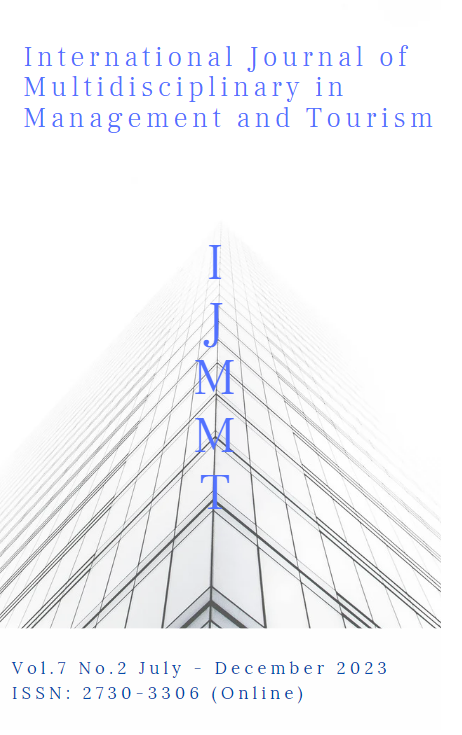Influence of Employee’s Expectancy to Operational Efficiency of SMEs in Dalian City, The People’s Republic of China
Main Article Content
Abstract
employees who work hard for the organization play an important part in making the organization successful. This research article aims (1) to study job characteristics that affect work efficiency (2) to study a new model to improve operational efficiency (3) to develop a model of work efficiency of employees in the organization. This research was mixed research using A group of 400 samples. Tools used. to collect data as a questionnaire Most of the quantitative questionnaires were sent by post, individual and in-depth interviews. Data were analyzed by descriptive statistics and content analysis. The research findings were as follows:
1. Regarding the impact of work characteristics on the work efficiency of small and medium-sized enterprises, the research found that we can use the intermediate variable motivation factors affecting expectations to conduct research. Employee work can be determined through wages and benefits, job security, work environment, relationship with superiors and supervisors. Relationships with colleagues to affect work efficiency.
2. In the original conceptual framework, we have a total of 7 assumptions, among which job characteristic has a direct impact on motivation factors affecting expectation, and also has a direct impact on work engagement and operational, but with the help of the SEM model, we found that the second hypothesis: job characteristics have a positive impact on operational efficiency, the current value is -0.87, so it can be concluded that hypothesis 2 is not valid. So, the new model can remove assumption 2 and keep other assumptions.
3. Regarding the development model to improve the operational efficiency of organizational employees, we only need to cancel the job characteristic that has a direct impact on operational efficiency.
Article Details

This work is licensed under a Creative Commons Attribution-NonCommercial-NoDerivatives 4.0 International License.
References
Abraham, J., & Barker, K. (2014). An expectancy-value model for sustained enrolment intentions of senior secondary physics students. Research in Science Education, 45(4), 509–526. https://doi.org/10.1007/s11165-014-9434-x
Boonyapraropchai, N., & Premthongsuk, P. (2023). A causal relationship model of factors affecting happiness at work of department stores employees in Bangkok. Journal of Educational Management and Research Innovation, 5(1), 147–162.
Chan, E. S., Ho, S. K., Ip, F. L., & Wong, M. W. (2020). self-efficacy, work engagement, and job satisfaction among teaching assistants in Hong Kong’s inclusive education. SAGE Open, 10(3). https://doi.org/10.1177/2158244020941008
Chen, J. (2019). Development of Chinese small and medium-sized enterprises. Journal of Small Business and Enterprise Development, 13(2), 140-147. https://doi.org/10.1108/ 14626000610665854
Chiang, C. F., & Jang, S. C. (2008). An expectancy theory model for hotel employee motivation. International Journal of Hospitality Management, 27 (2), 313–322. https://doi.org /10.1016/j.ijhm.2007.07.017
Ciemleja, G., & Lace, N.(2011). The model of sustainable performance of small and medium-sized enterprise. Engineering Economics, 22(5), 501-509. https://doi.org/ 10.5755/j01.ee.22.5.968
Cook, P. & Nixson, F. (2000) Finance and small and medium-sized enterprise development. University of Manchester.
Hackman, J. R., & Oldham, G. R. (1976). Motivation through the design of work: Test of a theory. Organizational Behavior and Human Performance, 16(2), 250-276. https://doi.org /10.1016/0030-5073(76)90016-7
Hackman, J. R., & Oldham, G. R., (1980). Job redesign. Addison-Wesley.
He, C., & Sun, P. (2023). Behavioral effects of performance in distinguishing between work connectivity behavior after-hours: Recognition role to compensation payments of workers fairly. Journal of Multidisciplinary in Humanities and Social Sciences, 6(1), 289–307.
Herzberg, F., Mausner, B., & Snyderman, B. B. (2011). The motivation to work. Transaction Publishers.
Jiang, Y., Rosenzweig, E. Q., & Gaspard, H. (2018). An expectancy-value-cost approach in predicting adolescent students’ academic motivation and achievement. Contemporary Educational Psychology, 54, 139–152. https://doi.org/10.1016/j.cedpsych.2018.06. 005
Linjee, C., Rattanavisut, S., Sutthitham, N., & Sangsuk, S. (2023). Efficiency of accounting information system used for enterprise resources planning of small and medium enterprises in Bangkok. Journal of Multidisciplinary in Humanities and Social Sciences, 6(2), 851–864
Onraksa, K., & Lekhavat, S. (2023). Implementing the economic ordering quantity principle for supplier selection: A case study of building store. Journal of Educational Management and Research Innovation, 5(2), 305–314
Pekrun, R., Lichtenfeld, S., Marsh, H. W., Murayama, K., & Goetz, T. (2017). Achievement emotions and academic performance: Longitudinal models of reciprocal effects. Child Development, 88(5), 1653–1670. https://doi.org/10.1111/cdev.12704
People's Daily. (2020). China's attitude and measures towards the epidemic are admirable. Retrieved from, https://baijiahao.baidu.com/s?id=1659465579094630859&wfr= spider&for=pc
Robijn, W., Euwema, M. C., Schaufeli, W. B., & Deprez, J. (2020). Leaders, teams and work engagement: A basic needs perspective. Career Development International, 25(4), 373-388. https://doi.org/10.1108/CDI-06-2019-0150
Ryan, R. M., & Deci, E. L. (2020). Intrinsic and extrinsic motivation from a self-determination theory perspective: Definitions, theory, practices, and future directions. Contemporary Educational Psychology, 61, Article 101860. https://doi.org/10.1016/j. cedpsych.2020.101860
Senko, C., Hulleman, C. S., & Harackiewicz, J. M. (2011). Achievement goal theory at the crossroads: Old controversies, current challenges, and new directions. Educational Psychologist, 46(1), 26–47. https://doi.org/10.1080/00461520.2011.538646
Ta, T. T., Doan, T. N., Tran, H. N., Dam, T. A., & Pham, T. M. (2022). Factors affecting the application of balanced scorecard to enhance operational efficiency of listed companies: The case of Vietnam. Cogent Business & Management, 9(1), Article: 2149146. https://doi.org/10.1080/23311975.2022.2149146
Vroom, V.H. (1970). Work and motivation. John Wiley & Sons.
Wood, J., Oh, J., Park, J., & Kim, W. (2020). The relationship between work engagement and work–life balance in organizations: A review of the empirical research. Human Resource Development Review, 19(3), 240–262. https://doi.org/10.1177/1534484320 917560

